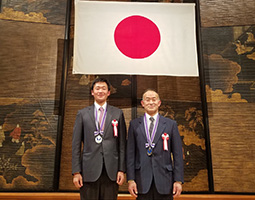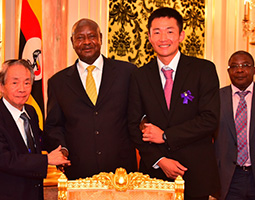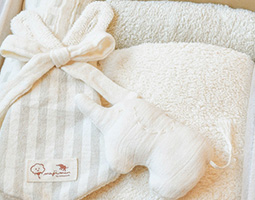Home > Highlighting JAPAN > Highlighting Japan July 2019 > Japan and Africa: Strengthening Bonds
Highlighting JAPAN
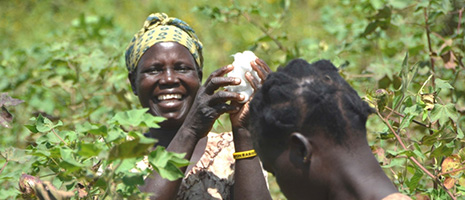
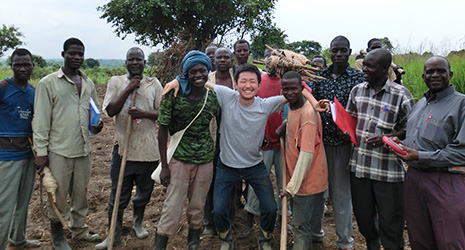
Cotton Connections: Uganda and Japan
An Osaka-based manufacturer imports quality cotton from Uganda to produce ultra-organic towels. The business, which has continued for two generations under father and son, now deeply connects two distant countries.
Uganda, which is located in the East African Highlands right on the equator, enjoys fertile soil and extensive rainfall. More than 70% of the Ugandan population is engaged in agriculture, with the nation’s main farming products including cotton, tea, tobacco and coffee. Ugandan cotton is organic and of high quality. However, because the textile industry was previously undeveloped, cotton was exported as a raw material, which did not lead to the production of products with high added value or to improving farmers’ incomes. In addition, the market was overflowing with inexpensive imported textile goods, which prevented the Ugandan textile industry from becoming internationally competitive. In this situation, a Japanese company collaborates with the Ugandan government to provide additional value to organic cotton and improve farmers’ incomes and quality of life. This Japanese company is Smiley Earth Co., Ltd., which is headquartered in Senshu District, Osaka, the origin of towel manufacturing in Japan.
The company imports organic cotton produced in the Gulu District in northern Uganda, manufactures environmentally friendly towels without any chemical drug treatment and sells them on the Japanese market.
The business was initiated by Ryuichi Oku, the father of the current president, Tatsumasa Oku. Behind their decision to use Ugandan cotton were two events that shook the local industries. First, a sharp increase in imports of cheap towels from other Asian countries in the 1990s forced many traditional towel manufacturers in Izumisano City to close their businesses. Second, the water pollution of the rivers running through the city became the worst in the country from the late 1990s to the early 2000s, when Izumisano City’s towel production peaked. The decline of towel production and civil actions led to improvements in the level of water contamination. At the time, however, Ryuichi decided to resolve the issue of factory wastewater, which was one of the causes of the pollution, and to make towels that no one could imitate with links to Africa, which he loved so much.
A journalist living in Africa who was aware of Ryuichi’s challenging plan introduced him to Yuichi Kashiwada, who had lived in Uganda for more than thirty years, ran a cotton textile factory there and was known as the “father of Uganda.” In 2006, Ryuichi visited Uganda and was impressed by the cotton, which was cultivated without using agricultural chemicals or chemical fertilizers. He made a proposal whereby his company would make towels with the cotton. In response to this suggestion, Kashiwada promised to provide organic cotton on the condition that Ryuichi would never waste the time and efforts that the Ugandan farmers had put into cultivating the cotton without pesticides.
This is how, in 2007, Ryuichi completed a new factory that would enable him to consistently handle every operation from twisted yarn-spinning to twisted yarn-processing on his own on the site of his company after two years’ construction work. In addition, he dug a well to avoid the chlorine in tap water, produced Ugandan-made shea butter soap in his own factory and developed unique refining techniques for washing cotton fiber. As a result, the amount of chemical drugs used was reduced to less than four hundredths of what it had originally been, which enabled Ryuichi to make towels with a reduced environmental load.
In 2013, Tatsumasa experienced a three-month internship program at Kashiwada’s company in Uganda and assumed the second presidency of that company after returning to Japan. Even now, Tatsumasa visits Uganda several times a year and communicates with the partner farmers in the Gulu District, eating and sleeping alongside them.
Tatsumasa says, “In the past, we received cotton whose quality was inferior to what we wanted. We cannot say that everything went smoothly. But as we had more dialogues and built relationships of trust, cotton farmers began working seriously on cultivating quality organic cotton.”
In 2015, Tatsumasa was recognized by the Ugandan government as the successor to Kashiwada, who had returned to Japan due to old age, and now supports farmers aiming to expand their organic cotton production and markets and works as a coordinator to support the friendly exchanges that link Japan and Uganda behind the scenes.
Tatsumasa also played an important role as a bridge-builder when Izumisano City became a partner city with Gulu in 2017 and when Izumisano City and Tateshina Town, Nagano, were registered as the host towns for the training camp of the Ugandan team for the 2020 Tokyo Olympic and Paralympic Games.
Cotton and towels have created a broader linkage between Uganda and Japan.
© 2009 Cabinet Office, Government of Japan
